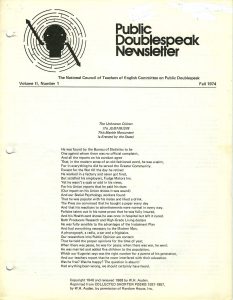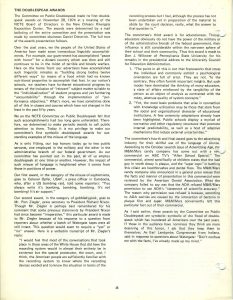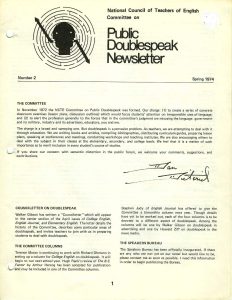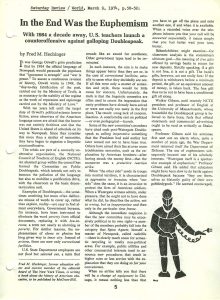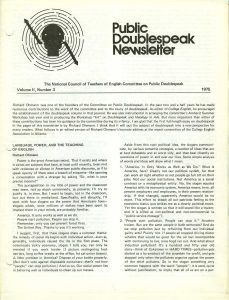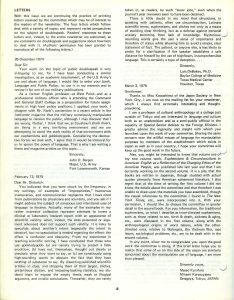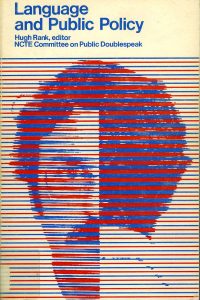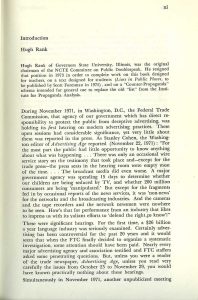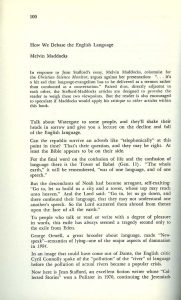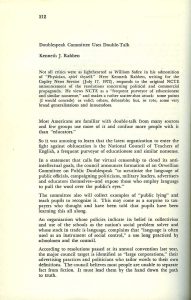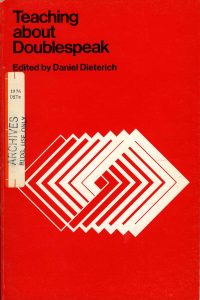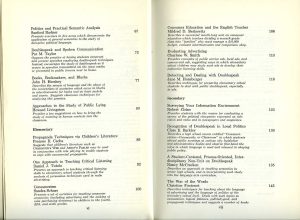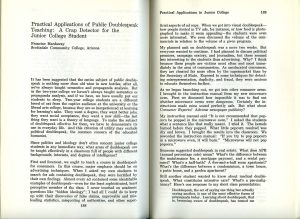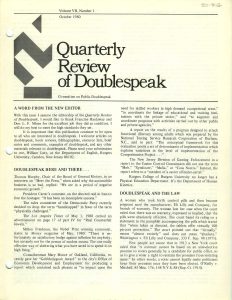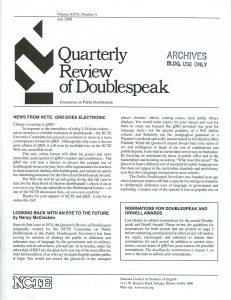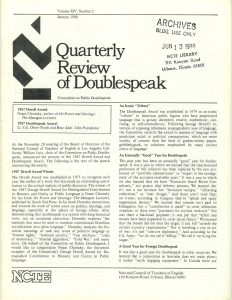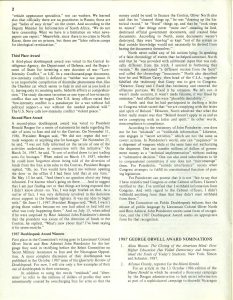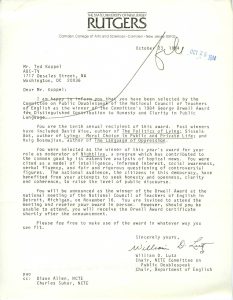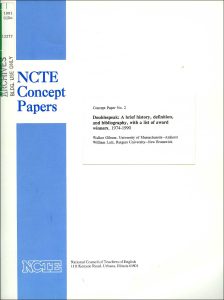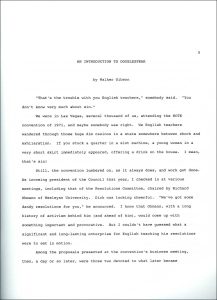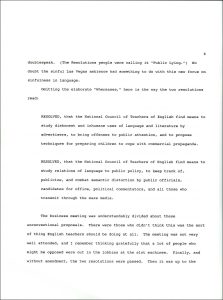“Our first award, in the category of the misuse of euphemisms, goes to Colonel Opfer, USAF, a press officer in Cambodia, who, after a U.S. bombing raid, told some reporters: ‘You always write it’s bombing, bombing, bombing. It’s not bombing! It’s air support.'”
From “The Doublespeak Awards,” Public Doublespeak Newsletter, Vol. 2, No. 1 (1974)
The pervasiveness of doublespeak in mass media was brought to NCTE’s attention at its 1971 convention in Las Vegas. In Doublespeak: A Brief History, Definition, and Bibliography, with a List of Award Winners, Walker Gibson, the incoming president, recalls Richard Ohmann, Resolutions Committee chair, approaching him before the convention’s annual business meeting. “We have some dandy resolutions for you,” he said (1991, p. 5). These resolutions directly addressed “commercial propaganda” and “semantic distortion” and would lead NCTE to take a national role in exposing “public lying” in the media:
RESOLVED, that the National Council of Teachers of English find means to study dishonest and inhumane uses of language and literature by advertisers, to bring offenses to public attention, and to propose techniques for preparing children to cope with commercial propaganda.
RESOLVED, that the National Council of Teachers of English find means to study relations of language to public policy, to keep track of, publicize, and combat semantic distortion by public officials, candidates for office, political commentators, and all those who transmit through the mass media.
Gibson described that those at the business meeting were divided on the resolutions, which would certainly drag NCTE into a politically-charged environment. Despite these concerns, the resolutions passed. “The meeting was not very well attended, and I remember thinking gratefully that a lot of people who might be opposed were out in lobbies at the slot machine,” Gibson joked (1991, p. 6).
George Orwell’s classic 1984 inspired the Council to refer to any language that violates their resolutions as “doublespeak.” In November 1972, on Gibson’s suggestion, the Committee on Public Doublespeak was formed (Hook, p. 255). Its charge was to develop classroom activities to help teachers educate students on doublespeak and its dangers. In addition, the committee also had to expose those who were manipulating language. It is this latter function that attracted the attention of the national news.
To fulfill this charge, the committee created the Doublespeak Award, which is described on NCTE’s website as an “ironic tribute to public speakers who have perpetuated language that is grossly deceptive, evasive, euphemistic, confusing, or self-centered.” Politicians, advertisers, and military officers are often the recipients of these awards. In 1975, the committee also established the NCTE George Orwell Award to recognize individuals who contribute to the “critical analysis of public discourse” rather than perpetuate doublespeak.
While these awards continue today, the Committee on Public Doublespeak has been renamed the Public Language Award Committee. To learn more about the history of this committee and its founders, take a look at the featured topics below:
- Public Doublespeak Newsletter, Fall and Spring 1974
- Public Doublespeak Newsletter, 1975
- Language and Public Policy
- Teaching about Doublespeak
- Quarterly Review of Doublespeak, 1980-2000
- Doublespeak: A Brief History, Definition, and Bibliography, with a List of Award Winners
Public Doublespeak Newsletter, Fall and Spring 1974
In the fall issue of its newsletter, Public Doublespeak Newsletter, the committee announced the winners of the first ever Doublespeak Award. The committee devised four categories: “misuse of euphemisms,” “gobbledygook,” “educationeze,” and “language of silence.” The winner in the most prominent of the categories, “misuse of euphemisms,” was Colonel Opfer and his insistence to reporters that bombing should be called air support. In its spring issue, the newsletter contained a reprint of an article from the Saturday Review, illustrating the media attention the committee brought to NCTE. Over the years, the Public Doublespeak Newsletter served to publicize not only committee business but to continually highlight doublespeak in daily life. Learn more: 15/71/804
Item: Copy of Public Doublespeak Newsletters (1974)
Public Doublespeak Newsletter, 1975
The Public Doublespeak Newsletter also printed letters from readers. The tone of the letters in the 1975 issue were largely positive. Everyone bemoaned the prevalence of deceptive language and supported the committee’s mission. Two of the letter writers, however, pointed out that doublespeak was not always done to purposely mislead readers. A Major in the U.S. Army wrote: “I think that we, as Cousteau’s shark divers, are living in a very terrifying environment and we are attempting to avoid the stark reality of that environment with our euphemisms and gobbledygook.” A scientist wrote that in his field, “physicians…often use circumlocution, Latinate scientific terms, euphemisms, and cliches not only as a means of avoiding clear thinking, but as a defense against personal anxiety stemming from lack of knowledge.” These letters also illustrated that the use of doublespeak is not always out of political or monetary concerns, but also personal ones. Learn more: 15/71/804
Item: Copy of Public Doublespeak Newsletter (1975)
Language and Public Policy
In 1974, Hugh Rank, the committee’s first chair, edited the book, Language and Public Policy, which was a collection of essays on the abuse of language. Watergate, deceptive marketing, and propaganda were among the topics discussed. It also featured an article by a journalist criticizing NCTE itself as “a frequent purveyor of educationese and similar nonsense.” In the abstract, Rank responded, “Some points (I would concede) as valid; others, debatable; but, in toto, [the author makes] some very broad generalizations and innuendoes.” Learn more: 15/73/803
Item: Copy of Language and Public Policy (1974)
Teaching about Doublespeak
Two years later, another chair of the Committee on Public Doublespeak published a collection of essays. However, Teaching about Doublespeak, edited by Daniel Dieterich, focused more on how instructors can create lessons and activities to educate students on deceptive language. Contributors also discussed how their lessons worked in their classroom. In her junior college class, Francine Hardaway focused on doublespeak in advertising rather than in politics: “Why? I think because these people are victims most often and most immediately in the area of consumerism. As uneducated consumers, they are cheated far more often by the supermarket than by the Secretary of State.” Other topics in this volume include propaganda in children’s literature, doublespeak in local politics, and the abuse of language in book blurbs. Learn more: 15/73/803
Item: Copy of Teaching about Doublespeak (1976)
Quarterly Review of Doublespeak, 1980-2000
In 1980, William Lutz became the new editor of the committee’s newsletter and renamed it the Quarterly Review of Doublespeak. The content, however, largely stayed the same, with the newsletter still focusing on exposing doublespeak in the mass media. In 2000, the newsletter faced another significant change, moving from a physical format to a solely electronic format. Learn more: 15/71/804
Item: Copies of Quarterly Review of Doublespeak (1980, 2000)
The George Orwell Award
While exposing the purveyors of doublespeak was a vital charge of the committee, it did not always concentrate on the negative. According to the committee’s website, it created “The George Orwell Award for Distinguished Contribution to Honesty and Clarity in Public Language” to recognize those who “contribute to honesty and clarity in public language.” The award was established in 1975 and is given out alongside the Doublespeak Award. A copy of the 1988 newsletter illustrated the process of how individuals were selected for the awards. Authors and journalists are often the recipients of the George Orwell Award, as demonstrated by this letter congratulating Ted Koppel for his work as moderator of Nightline. Learn more: 15/71/804
Item: Copy of Quarterly Review of Doublespeak (1988); Letter to Ted Koppel (1984)
Doublespeak: A Brief History, Definition, and Bibliography
In 1991, as part of NCTE’s series of concept papers, the Council published Doublespeak: A Brief History, Definition, and Bibliography, with a List of Award Winners. Written by Walker Gibson, he recounted the origins of the Committee on Public Doublespeak and his role in encouraging its development. Gibson used colorful anecdotes in his account, as when he wrote about the 1971 convention where the resolutions that would start the committee passed. He began: “‘That’s the trouble with you English teachers,’ somebody said. ‘You don’t know very much about sin.'” Learn more: 15/71/821
Item: Copy of Doublespeak: A Brief History, Definition, and Bibliography, with a List of Award Winners (1991)
